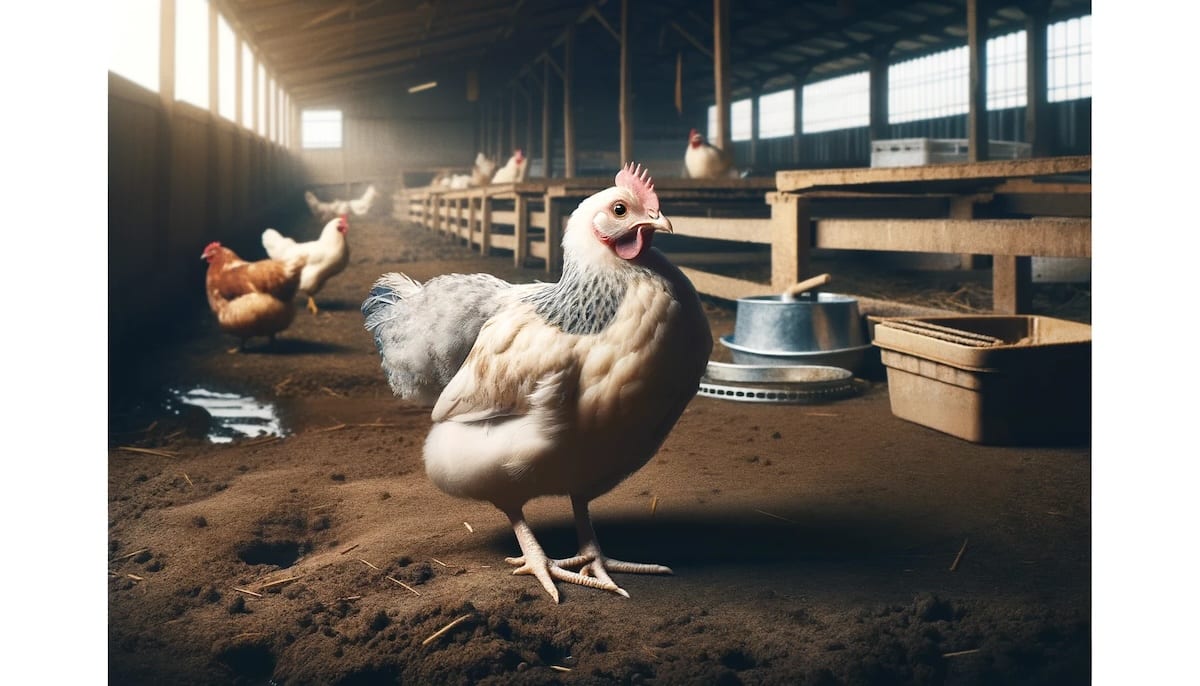Coccidiosis in Chickens: Causes, Symptoms, and Prevention
Coccidiosis in Chickens: Causes, Symptoms, and Prevention
Microscopic parasites called coccidia are the cause of coccidiosis, a common and potentially fatal disease in chickens.
While all chickens naturally carry a small number of coccidia in their digestive tract, the real trouble begins when they are exposed to unfamiliar strains. Chickens that are sick, stressed, or have compromised immune systems are particularly vulnerable to coccidiosis, and the infection can spread quickly through the flock, leading to serious illness or even death within days.
As a backyard chicken keeper, it’s crucial to recognise the signs of coccidiosis early. Quick treatment can save your flock. In this article, we’ll walk you through the symptoms, causes, and how to prevent this disease in your chickens.
If you already know the signs and symptoms, you need to start immediate treatment with Amprolium or Baycox by Bayer.
What Are the Symptoms of Coccidiosis in Chickens?
Although some coccidia live harmlessly in your chickens' intestines, an infection caused by unfamiliar strains can lead to serious health problems. Here are the key symptoms to watch out for:
- Bloody or watery diarrhea
- Lethargy and weakness
- Loss of appetite
- Pale combs and wattles
- Droopy posture and wings
- Ruffled or puffed-up feathers
- Glazed, dull eyes
- Poor growth in chicks
- Sudden death
Chicks and younger birds are especially at risk because they haven’t yet built up immunity to the parasite. Additionally, birds suffering from malnutrition, stress, or other health problems are more susceptible to coccidiosis.
If you notice any of these symptoms, it's critical to start treatment right away.
Common treatments include Amprolium or Baycox by Bayer, both of which are effective at tackling the infection.
You can use our Dine-A-Chook medication drinker to administer the coccidiosis medicine to your chickens.
How to Treat Coccidiosis in Chickens
If you suspect coccidiosis in your flock, immediate treatment is critical. Since the disease spreads quickly, treating just one bird may not be enough; it’s often best to treat the entire flock as a precaution.
Here’s what you need to do:
- Isolate sick birds: Immediately separate any birds showing signs of coccidiosis to prevent further spread.
- Treat with anticoccidial drugs: The most common treatment for coccidiosis is Amprolium, which is highly effective and available without a prescription. Follow the dosage instructions carefully. Baycox by Bayer is another treatment option but should be used with care to avoid overdosing. Using a medication drinker may help administering the medicine.
- Maintain hydration: Sick chickens may refuse food and water, but keeping them hydrated is essential. Add electrolytes to their water to support recovery, and consider administering water with a dropper if the chicken isn’t drinking on its own.
- Monitor for drug resistance: Be aware of the potential for drug-resistant strains of coccidia. If treatment doesn’t seem effective, consult with a vet about alternative medications or treatment plans.
What Causes Coccidiosis in Chickens?
Coccidiosis is caused by coccidia eggs, or oocysts, which are laid in the infected chicken's gut and passed through their faeces. These eggs are then ingested by other birds, continuing the life cycle. Once inside a new host, the parasite burrows into the lining of the intestines, disrupting digestive function and causing a range of health issues.
Here are the most common ways coccidia spreads:
- Dirty environments: Chickens peck at the ground and can easily ingest oocysts from contaminated soil, bedding, or feed.
- Wet and warm conditions: Coccidia thrive in moist environments, which is why keeping the coop dry is crucial for preventing outbreaks.
- Overcrowding: More chickens in a confined space lead to more droppings and more opportunities for the parasite to spread.
- Wild birds and pests: Wild birds and rodents can carry coccidia into your flock, even if you maintain a clean coop.
- New birds: Introducing new chickens to your flock without proper quarantine is one of the main ways unfamiliar coccidia strains enter the coop. Even seemingly healthy birds can carry strains that your existing flock is not immune to.
Coccidiosis and Your Coop: How It Spreads
Coccidiosis is a tricky disease because it can easily spread through the smallest, unnoticed contamination. Something as simple as dirty shoes or equipment from another chicken coop can introduce new coccidia strains to your flock. The parasites thrive in warm, wet conditions, and their eggs can survive for up to a year in the environment, making it difficult to completely eliminate the risk.
Common sources of new coccidia include:
- Introducing new chickens: This is the most common way coccidiosis spreads. Always quarantine new birds for at least two weeks before introducing them to the flock.
- Travelling with chickens: If you take your birds to shows or events and bring them back, there’s a risk they’ve been exposed to unfamiliar strains of coccidia.
- Sharing equipment: Pre-owned feeders, coops, or even egg cartons from other chicken keepers should always be sanitised thoroughly before use to avoid cross-contamination.
Maintaining strict biosecurity measures is crucial in preventing the spread of coccidia. With proper precautions and regular cleaning, you can greatly reduce the risk of infection.
How to Prevent Coccidiosis in Chickens
Prevention is always better than cure, especially when it comes to coccidiosis, which can spread rapidly through your flock. For New Zealand chicken keepers, the damp climate, especially in regions with frequent rainfall, can make coccidiosis a more common issue. Here’s how you can take action to prevent the disease from taking hold:
1. Good Coop Management
Keeping your coop clean and dry is the foundation of preventing coccidiosis. Oocysts thrive in wet, warm environments, so regular cleaning and ensuring good airflow are essential. Here are some best practices:
- Keep the coop dry: Make sure the bedding is changed regularly, especially during wet weather. In New Zealand’s rainy seasons, it's crucial to ensure the coop stays well-ventilated to avoid excess moisture buildup.
- Practice good biosecurity: If you have visitors from other chicken coops, ask them to change their shoes before entering your yard. If you use shared equipment, disinfect it thoroughly.
- Limit contact with wild birds: Use bird netting to help keep wild birds out of your chicken coop. These birds can carry oocysts into your flock, and it's difficult to control exposure unless you take preventive measures.
2. Treating Young Chicks
Young birds are especially vulnerable to coccidiosis because their immune systems haven’t had time to develop resistance to the parasite.
There are two common ways to help chicks build immunity:
- Vaccination: Many commercially bought chicks are vaccinated against coccidiosis. If you buy new chicks, always ask if they have been vaccinated before bringing them home. However, if your chicks are vaccinated, avoid feeding them medicated feed, as it can cancel out the benefits of the vaccination.
- Medicated feed: If vaccination isn’t an option, medicated chick starter feed can be used to help young birds build up immunity. This feed contains a coccidiostat, a mild anti-coccidiosis drug that prevents the parasite from multiplying. It’s important to only use this feed for chicks, and you should stop the treatment after eight weeks. Remember not to consume eggs from chickens that are on medicated feed.
3. Balanced Diet and Probiotics
A healthy chicken with a strong immune system is much better equipped to fight off infections like coccidiosis. Provide your flock with a well-balanced, nutritious diet, and consider adding probiotics, especially during times of stress like moulting or after introducing new birds.
→ Shop for chicken feeder and drinker kits
Probiotics help strengthen your chickens' digestive health and can reduce the chances of the parasite causing harm. You can also add apple cider vinegar to your flock’s drinking water as a natural preventative measure.
Some research suggests that apple cider vinegar helps reduce coccidia eggs in faeces and may make treatments more effective.
Does Using Apple Cider Vinegar Help for Coccidiosis?
In recent years, apple cider vinegar (ACV) has become a popular natural remedy among backyard chicken keepers in New Zealand and around the world. Research from the Polish Journal of Veterinary Sciences has shown that ACV can reduce the number of coccidia oocysts in faeces and help lower resistance to drug treatments. While it’s not a cure on its own, apple cider vinegar can be a great supplement to traditional treatments. Read the full study.
To use apple cider vinegar as a preventative measure, simply add a small amount (around 5ml per litre of water) to your chickens' drinking water. This can help maintain digestive health and potentially reduce the risk of coccidiosis outbreaks, especially in wet and humid weather common in New Zealand.
Frequently Asked Questions
1. Can coccidiosis affect adult chickens?
Yes, adult chickens can get coccidiosis, but it’s less common in healthy adults because they usually develop resistance to the strains they are exposed to over time. However, introducing new chickens or coccidia strains can lead to outbreaks in adult birds, especially if they are stressed or immunocompromised.
2. Can coccidiosis spread to other animals or humans?
Coccidiosis in chickens is caused by species-specific parasites (coccidia). The strain that affects chickens doesn’t infect humans or other animals, so there’s no direct risk to you or your other pets.
3. How long does it take for coccidiosis to spread?
Coccidiosis can spread quickly, especially in warm and wet conditions. In some cases, chickens can show symptoms within just a few days of exposure. It’s important to act fast when you spot symptoms to prevent the spread through your flock.
4. Can I prevent coccidiosis without using drugs?
Yes, you can take a natural approach to prevention by focusing on good coop hygiene, dry conditions, and adding supplements like apple cider vinegar to your chickens' water. However, if an outbreak occurs, medications such as Amprolium are usually necessary to control the disease effectively.
5. Can I eat the eggs from chickens treated for coccidiosis?
When using medicated feed or anticoccidial drugs like Amprolium, it’s generally recommended to avoid consuming the eggs until the treatment period is over. Always check the specific medication instructions for any egg withdrawal periods.
Helpful Links:
Keeping Chickens Healthy in Wet weather
Top 6 Ways to prevent disease in the Chicken Coop
How Chicken Drinkers with lubing cups help prevent contamination






